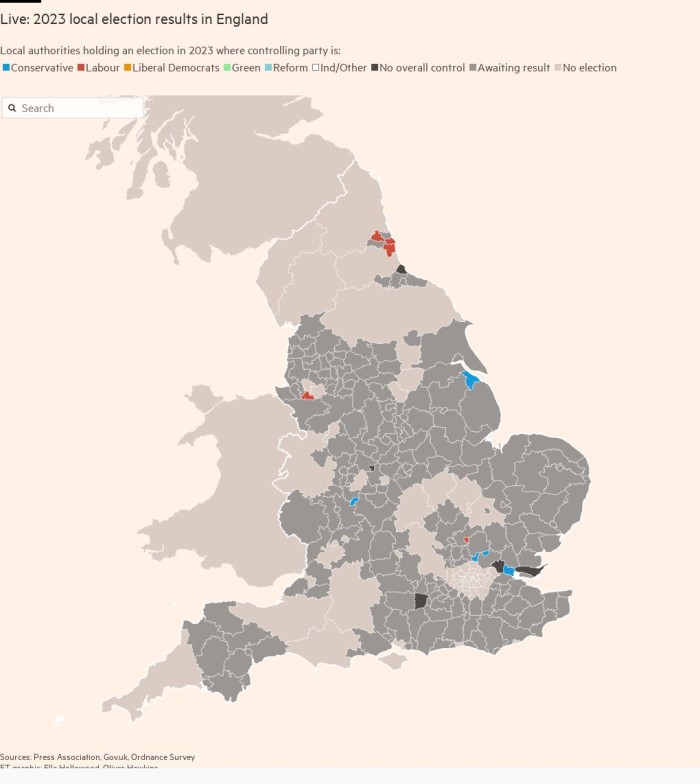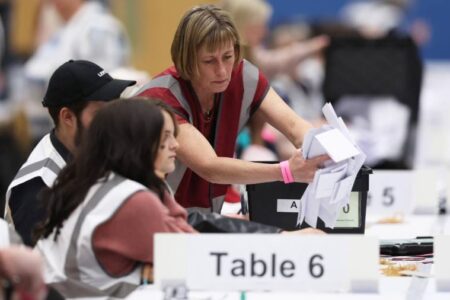Rishi Sunak’s Conservatives on Friday faced heavy losses in UK local elections as voters in many parts of England turned against the party after a turbulent year.
The Prime Minister awoke to news that his party was on the verge of collapse, with Labor gaining ground in the north and the Midlands and the Liberal Democrats gaining ground in the affluent areas of the south.
Early results suggested the Conservatives could lose up to 1,000 seats in the council compared to where they stood before the election, matching some of the party’s most pessimistic predictions.
But the count overnight was only done in about a quarter of the 8,000 seats, and Sunak and his rivals will have to wait until a full picture emerges on Friday afternoon.
Labor took control of Medway Council in Kent, taking it from the Conservatives for the first time in 20 years. The party also took control of Plymouth City Council in southwest England, along with Stoke-on-Trent, part of the former “red wall” that fell to the Conservatives Boris Johnson in the 2019 election.
Labor said the party was making gains in the kinds of seats it needed to win again in a general election expected next year. “These results show that we are on our way to a Labor majority government,” said Shabana Mahmood, Labor campaign chair.
But preliminary results suggest Labor leader Sir Keir Starmer still has more to do to be confident of winning an outright majority in the next general election – gains shared with the Liberal Democrats and Greens.
The Conservatives lost complete control in a number of other councils, including Brentwood in Essex, Tamworth in Staffordshire, Hertsmere in Hertfordshire, East Lindsey in Lincolnshire and North West Leicestershire.
Liberal Democrat leader Sir Ed Davey said the results gave him a “Cheshire cat” grin and claimed his party was leading across the country. He said the Liberal Democrats had taken control of Windsor and Maidenhead council, the borough represented by former Prime Minister Theresa May.
By midday on Friday, Labor had gained 143 seats from its position just before the election, while the Liberal Democrats had gained 60 and the Conservatives had lost 195.

Sunak said voters had made it clear they wanted him to focus on their priorities – the economy, the NHS and immigration – but insisted the Tories had made progress in limited areas such as Peterborough.
Greg Hands, chair of the Conservative Party, said: “We always said it was going to be a tough night for us, and that turned out to be the case. It was a disappointing night for the party and the government.”
Pollster Sir John Curtis wrote on the BBC website that it was possible for the Conservatives to reach the threshold of losing 1,000 seats, but added that the gains were split more evenly than expected between Labor and the Liberal Democrats.
Curtis wrote: “Labour will be disappointed that it looks as though their vote is on par with their performance in last year’s local elections, although the Conservatives are still five points behind 12 months ago.”
Since the last round of local elections, the Conservative Party has had three prime ministers – Johnson, Les Truss and Snack – and presided over a period of political and economic chaos.
The local elections are likely to be the last big test of public opinion at the polls before the general election, expected in the summer or fall of 2024.
An election for the contested wards was last held on a Thursday in 2019, when May’s Conservative Party and Jeremy Corbyn’s Labor Party underperformed.
Curtis said Labor needed to lead by more than 10% of the vote in the election to be sure of a parliamentary majority in the general election.
A Labor spokesperson said: “In relation to the results announced so far, we are confident that Labor will receive an equivalent vote share of at least eight points which will represent our best result since 1997”.
Data and graphics by Oliver HawkinsAnd Ella Holwood And Martin Stubby
